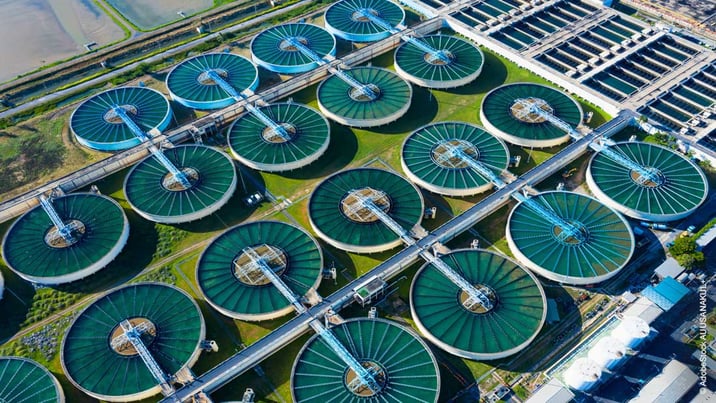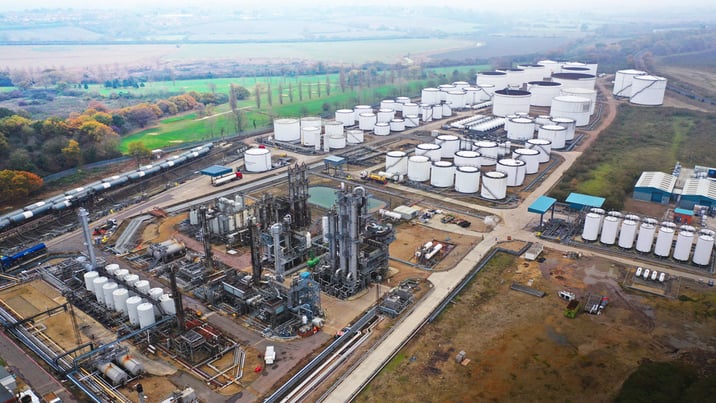
The advantages of NSF certification for low-viscosity base oils
Certifications guarantee independent testing and fulfil legal requirements. Above all, however, they create trust in products and their ingredients. In food and beverage production, but also in many other companies where food and machinery come into contact, NSF certification of lubricants or process oils is of great importance. It is a seal of quality and stands for food safety. The following article explains the benefits for manufacturers, suppliers and customers in the food processing industry.

Interview: New NSF-certified Pilot® Oils for the food industry
With a specialised portfolio of low-viscosity base oils, Haltermann Carless offers high-quality products that can be tailored to the individual needs of different industrial machinery and equipment and their lubricants. Suppliers and manufacturers in the food and beverage industry now have access to a range of NSF-certified Pilot® Oils. Find out what important added value these Pilot® Oils offer in an interview with Dr André Rosehr, Technical Service & Development Manager at Haltermann Carless.

Lubricants: NSF certification offers food safety
Lubricants and process oils are a basic prerequisite for long-lasting and smoothly operating machinery. High quality requirements are placed on these products if they could potentially come into contact with beverages, food and animal feed. NSF certification focuses precisely on this case and certifies products such as lubricants for safe use. In the following article, you can find out more about the NSF certification content, the different NSF categories and what advantages certified products offer.

Water treatment: What are the advantages of flocculation?
Water management is a key component of greater sustainability for industry, as well as for local communities and cities. In addition to reducing water consumption, a major focus is on reuse and therefore on water treatment. Various processes help to purify the water in the respective wastewater treatment stages and return it to the water cycle. Flocculation plays an important role in this - find out why here.

Water treatment: New Pilot® oils for flocculants
Flocculation is an important process in wastewater treatment plants. Various flocculants are used in this process. They are responsible for causing solids to agglomerate into larger clusters so that they can be better separated from the water to be purified. Haltermann Carless now offers new low-viscosity base oils for water treatment. As a carrier fluid for polyacrylamide emulsions, Pilot® H products are characterised by their technical improvements and, above all, by their low aromatic content and biodegradability. Find out more about the advantages of our new Pilot® oils for flocculants.

Water treatment: Conserving resources for the most valuable feedstock
As early as 1992, the global community recognised that water sustainability concepts are of crucial importance and adopted the guiding principle of sustainable development. Since then, the protection of water resources has been one of the United Nations' greatest tasks and is anchored in the 6th Sustainable Development Goal. Water treatment plays a central role in achieving the sustainable development. In the following article you will learn more about water recycling, treatment processes and why industry is part of the solution.

Lubricants: Important facts about industrial lubricants
Without industrial lubricants, many moving mechanical elements cannot function smoothly. Today, the industry uses high-performance lubricants with properties that are adapted to the respective process conditions. Here you can find out the most important facts about industrial lubricants.

Industrial lubrication: High-quality lubricants and their base oils
Industrial lubricants reduce friction between moving surfaces. They are used to modify surface properties, regulate temperature and remove debris. In industry, they protect equipment and machinery and ensure extended service life of mechanical components. Low-viscosity base oils are important raw materials for many lubricants, coolants and metalworking fluids. Read more about the properties of modern base oils and the benefits they provide to industrial lubricants.

Pilot® Oils: New qualities for silicone sealant manufacturers
No matter whether they are used in bathroom joints or kitchens - silicone sealants are an important product in the DIY sector. It is a material that exists in many areas of everyday life. High-quality ingredients, such as the low-viscosity extender oils in silicone sealants, are a decisive factor and one of reasons for Haltermann Carless’s recent investment in plant technology. The goal: to produce even better, higher purity products for the base oils industry. Read more here.

High quality made by Haltermann Carless: Production of extender oils
Silicone sealants have to meet high requirements: They must not become brittle, must be tear-resistant and should not yellow over time. To achieve best results, low-viscosity base oils of the highest quality are needed. These special products are an important component of silicone sealants and are used as so-called extender oils. The following article explains which quality characteristics are important and how quality is ensured during the manufacturing process.
Latest Blog Posts
Topics
- Aerospace (7)
- Agrochemicals (7)
- Aromatic Solvents (8)
- Automotive Industry (5)
- Base Oil (3)
- Company (11)
- Construction (19)
- Digitalisation (3)
- Extender Oil (3)
- Food Industry (3)
- Fuels (6)
- Fuels Industry (3)
- GTL (2)
- Insulation (17)
- Middle Distillates (16)
- Paints, Coatings & Adhesives (5)
- Pentanes (29)
- Pharmaceutical Industry (11)
- Racing Fuels (2)
- Refrigerator Industry and Cooling Logistics (4)
- Silicone Sealants (1)
- Sites & Production (7)
- Solvents (15)
- Supply Chain (11)
- Sustainability (32)
- Sustainable Aviation Fuel (SAF) (9)
- Unternehmen (1)
- Water Treatment (3)


















